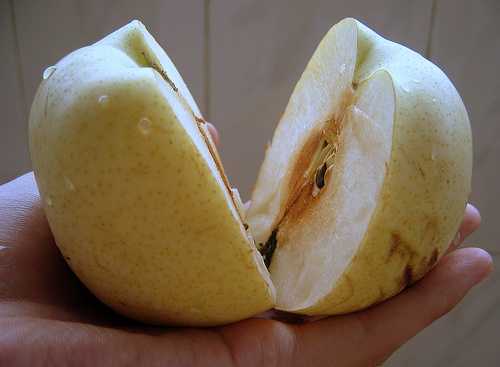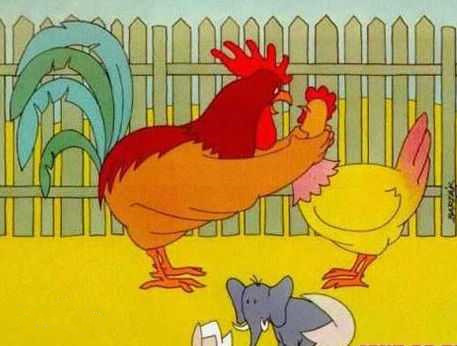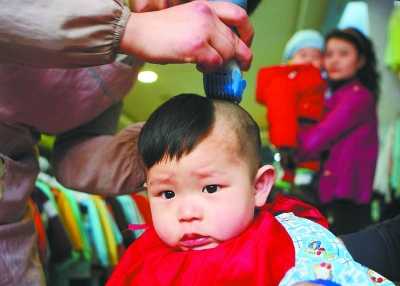Top 8 Chinese Taboos
¡±When in Rome, do as Romans do.¡± When you are learning Chinese, you should know taboos in China. In Chinese culture, there are many taboos that you should never try, because they may bring BAD luck! Let¡¯s begin the top 8 countdown.
1. Don¡¯t Share a Pear
Sharing a pear with your friends or families, especially your loved ones can be a big taboo in China. In Chinese, the phrase for ¡°sharing a pear¡± is ·ÖÀæ(f¨¥n l¨ª). It is a homophone of ·ÖÀë(f¨¥n l¨ª) which means ¡°to separate¡±. Certainly you don¡¯t want to separate with your loved ones. So, whenever you eat a pear, eat it all by yourself!

Sharing Pears Is Bad Luck in Chinese Culture
2. Use Chopsticks Correctly
When you are dining at a Chinese table, you should never leave chopsticks standing straight up in the bowl of rice. This is considered as very bad table manners in China. According to Chinese taboos, this act is said to bring bad luck as the chopsticks in rice look similar to the tombstone in the graveyard. So, just put them down on the table when you are not using them.
3. Don¡¯t Wear a Green Hat
Did you ever notice a very interesting phenomenon? In China, you may have seen a green T-shirt, a green bag, or green shoes, but never a green hat! This is because no one wants to wear a Green Hat! In China, wearing a green hat means to cheat on your husband. There are many versions of stories about this saying. One of them is that the wife made a green hat for her husband, so each time the husband wearing the green hat walks back home, the wife and her lover can see it from far distance and have time to let her lover leave before the husband notice anything.

Never Wear a Green Hat
4. Giving the Right Gifts
China is a country that emphasizes on exchanging gifts. By giving gifts, the relationships are enhanced. However, you cannot give a Chinese friend these gifts:
ÖÓ (zh¨n¨À), clock
ÖÓ is a homophone of ÖÕ(zh¨n¨À), which means ¡°the end¡±. The phrase ËÍÖÓ (s¨°n¨À zh¨n¨À) has the meaning of ËÍÖÕ(s¨°n¨À zh¨n¨À)£¬which means to farewell a person who is dying.
É¡ (s¨£n), umbrella
Similarly, you should not give É¡ (s¨£n) which pronounces similar to É¢ s¨¤n, meaning ¡°to separate¡±.5. Don¡¯t Cut Hair in the First Month of the Lunar Year
According to Chinese culture and traditions, cutting your hair in the first month of the lunar year can bring very bad luck to your ¾Ë¾Ë(ji¨´jiu), who is your mother¡¯s brother or uncle in English. To perform best practices and to bring good luck in the coming New Year, one should not cut hair until Feb 2nd in Chinese lunar calendar.

Cut Hair at a Proper Time
6. Don¡¯t cry on New Year¡¯s Day
Chinese New Year is the most important festival in China. There are many traditions on this day such as exchanging Chinese New Year greetings, setting firecrackers, etc. Because it is the new beginning, Chinese people will make this festival ¡°perfect¡± and avoid any unhappy things including CRYING. If you do cry, it is said you will cry all year.
7. Get Away from Four
Chinese people specially don¡¯t like the number 4(s¨¬), because it is a homophone of the Chinese character ËÀ(s¨«), which means ¡°to die¡± in Chinese. So, avoid using numbers that contain 4, such as 14, 44, etc.

"4" Is An Unlucky Number
8. Don¡¯t Whistle at Night
You must keep away from whistling during the night. In China, people believe spirits and ghosts will come out at night to perform daily activities. According to the old individuals, whistling at night is certain to draw the attention of wandering spirits who will follow the whistle and take away the person who whistles. Sound scary, right?
Above are the top 8 taboos in Chinese culture. Besides these, these are certainly many other taboos that you should avoid. To know more about Chinese culture and traditions, stay with us in the coming articles!
Are you ready to do a quiz?

Experience Your First Class!
Get a 30-minute FREE trial to see what our online classes look like.
Apply Now







